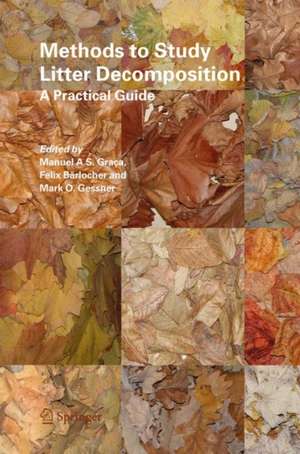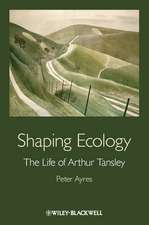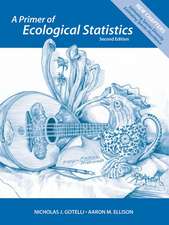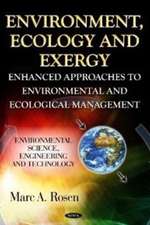Methods to Study Litter Decomposition: A Practical Guide
Editat de Manuel A.S. Graça, Felix Bärlocher, Mark O. Gessneren Limba Engleză Hardback – 5 apr 2005
| Toate formatele și edițiile | Preț | Express |
|---|---|---|
| Paperback (1) | 977.11 lei 38-44 zile | |
| Springer International Publishing – 26 aug 2021 | 977.11 lei 38-44 zile | |
| Hardback (2) | 982.95 lei 38-44 zile | |
| Springer International Publishing – 31 iul 2020 | 982.95 lei 38-44 zile | |
| SPRINGER NETHERLANDS – 5 apr 2005 | 1386.17 lei 43-57 zile |
Preț: 1386.17 lei
Preț vechi: 1690.45 lei
-18% Nou
Puncte Express: 2079
Preț estimativ în valută:
265.33€ • 288.30$ • 223.02£
265.33€ • 288.30$ • 223.02£
Carte tipărită la comandă
Livrare economică 21 aprilie-05 mai
Preluare comenzi: 021 569.72.76
Specificații
ISBN-13: 9781402033483
ISBN-10: 1402033486
Pagini: 340
Ilustrații: X, 329 p.
Dimensiuni: 156 x 232 x 24 mm
Greutate: 0.59 kg
Ediția:2005
Editura: SPRINGER NETHERLANDS
Colecția Springer
Locul publicării:Dordrecht, Netherlands
ISBN-10: 1402033486
Pagini: 340
Ilustrații: X, 329 p.
Dimensiuni: 156 x 232 x 24 mm
Greutate: 0.59 kg
Ediția:2005
Editura: SPRINGER NETHERLANDS
Colecția Springer
Locul publicării:Dordrecht, Netherlands
Public țintă
Professional/practitionerCuprins
Litter Dynamics.- Litter Input.- Leaf Retention.- Manipulation of Stream Retentiveness.- Coarse Benthic Organic Matter.- Leaching.- Leaf Mass Loss Estimated by Litter Bag Technique.- Coarse Particulate Organic Matter Budgets.- Leaf Chemical And Physical Properties.- Determination of Total Nitrogen and Phosphorus in Leaf Litter.- Total Protein.- Free Amino Acids.- Determination of Total Carbohydrates.- Determination of Soluble Carbohydrates.- Total Lipids.- Total Phenolics.- Radial Diffusion Assay for Tannins.- Acid Butanol Assay for Proanthocyanidins (Condensed Tannins).- Proximate Lignin and Cellulose.- Leaf Toughness.- Microbial Decomposers.- Techniques for Handling Ingoldian Fungi.- Maintenance of Aquatic Hyphomycete Cultures.- An Illustrated Key to the Common Temperate Species of Aquatic Hyphomycetes.- Molecular Approaches to Estimate Fungal Diversity. I. Terminal Restriction Fragment Length Polymorphism (T-RFLP).- Molecular Approaches to Estimate Fungal Diversity. II. Denaturing Gradient Gel Electrophoresis (DGGE).- Sporulation by Aquatic Hyphomycetes.- Ergosterol as a Measure of Fungal Biomass.- Acetate Incorporation into Ergosterol to Determine Fungal Growth Rates and Production.- Bacterial Counts and Biomass Determination by Epifluorescence Microscopy.- Secondary Production and Growth of Litter-Associated Bacteria.- Isolation of Cellulose-Degrading Bacteria.- Extraction and Quantification of ATP as a Measure of Microbial Biomass.- Respirometry.- Enzymatic Capabilities.- Extractellular Fungal Hydrolytic Enzyme Activity.- Cellulases.- Viscosimetric Determination of Endocellulase Activity.- Fluorometric Determination of the Activity of ?-Glucosidase and Other Extracellular Hydrolytic Enzymes.- Pectin-Degrading Enzymes: Polygalacturonase and Pectin Lyase.-Lignin-Degrading Enzymes: Phenoloxidase and Peroxidase.- Phenol Oxidation.- Proteinase Activity: Azocoll and Thin-Layer Enzyme Assay.- Detritivorous Consumers.- Maintenance of Shredders in the Laboratory.- Feeding Preferences.- Data Analysis.- Biodiversity.- A Primer for Statistical Analysis.
Recenzii
From the reviews:
"This book is a laboratory manual detailing some of the available methods to study plant litter and its decomposition. … The procedural descriptions are adequately detailed, and include comprehensive checklists of equipment, chemicals, and solutions. Example calculations are often provided. … As a practical manual this is a useful volume … . it is a well-produced course manual … ." (Karl Ritz, Mycological Research, 2005)
"This book is a laboratory manual detailing some of the available methods to study plant litter and its decomposition. … The procedural descriptions are adequately detailed, and include comprehensive checklists of equipment, chemicals, and solutions. Example calculations are often provided. … As a practical manual this is a useful volume … . it is a well-produced course manual … ." (Karl Ritz, Mycological Research, 2005)
Textul de pe ultima copertă
Decomposition of organic matter is a major ecosystem process involving an array of different organisms, including bacteria, fungi and invertebrates. The main objective of this book is to provide students and laboratory instructors at universities and professional ecologists with a broad range of established methods to study plant litter decomposition. Detailed protocols for direct use in the field or laboratory are presented in an easy to follow step-by-step format. A short introduction to each protocol reviews the ecological significance and principles of the technique and points to key references. Although most methods are described for freshwater ecosystems, many will work equally well in the presented or slightly modified form for studies in marine and terrestrial environments.
Descriere
Descriere de la o altă ediție sau format:
Decomposition of organic matter is a major ecosystem process involving an array of different organisms, including bacteria, fungi and invertebrates. The main objective of this book is to provide students and laboratory instructors at universities and professional ecologists with a broad range of established methods to study plant litter decomposition. Detailed protocols for direct use in the field or laboratory are presented in an easy to follow step-by-step format. A short introduction to each protocol reviews the ecological significance and principles of the technique and points to key references. Although most methods are described for freshwater ecosystems, many will work equally well in the presented or slightly modified form for studies in marine and terrestrial environments.
Decomposition of organic matter is a major ecosystem process involving an array of different organisms, including bacteria, fungi and invertebrates. The main objective of this book is to provide students and laboratory instructors at universities and professional ecologists with a broad range of established methods to study plant litter decomposition. Detailed protocols for direct use in the field or laboratory are presented in an easy to follow step-by-step format. A short introduction to each protocol reviews the ecological significance and principles of the technique and points to key references. Although most methods are described for freshwater ecosystems, many will work equally well in the presented or slightly modified form for studies in marine and terrestrial environments.
Notă biografică
Felix Bärlocher is a Research Professor at Mt. Allison University, Sackville, New Brunswick, Canada. He retired from teaching in 2016. He has pioneered and published landmark studies on the ecology of aquatic hyphomycetes, a polyphyletic group of fungi that dominate the decomposition of riparian tree leaves in streams. Additional central research interests are the taxonomy and evolution of aquatic hyphomycetes, molecular approaches to characterize these fungi and trophic interactions with litter-consuming invertebrates.
Mark O. Gessner is Department Head at the Leibniz Institute of Freshwater Ecology and Inland Fisheries (IGB) and Professor at the Berlin Institute of Technology (TU Berlin) in Germany. Trained as an aquatic ecosystem scientist, he is widely recognized for his work over 30 years on ecosystem processes, particularly many facets of the decomposition of plant litter in freshwaters, including the role of fungi, bacteria and detritivorous invertebrates, as well as the importance of changing environmental conditions, biodiversity and human activities in controlling decomposition rates. Manuel A.S. Graça is a Researcher at MARE (Marine & Environmental Sciences Centre) and Professor at the University of Coimbra, Portugal. His extensive work for more than 30 years in Mediterranean and tropical climates has focused on shaded headwater streams, where he investigates particularly the trilogy of leaf litter – microbial decomposers – litter-consuming detritivores and their role in detrital food webs. Studies on anthropogenic impacts on streams and benthic stream invertebrates are also a major long-standing research interest.
Mark O. Gessner is Department Head at the Leibniz Institute of Freshwater Ecology and Inland Fisheries (IGB) and Professor at the Berlin Institute of Technology (TU Berlin) in Germany. Trained as an aquatic ecosystem scientist, he is widely recognized for his work over 30 years on ecosystem processes, particularly many facets of the decomposition of plant litter in freshwaters, including the role of fungi, bacteria and detritivorous invertebrates, as well as the importance of changing environmental conditions, biodiversity and human activities in controlling decomposition rates. Manuel A.S. Graça is a Researcher at MARE (Marine & Environmental Sciences Centre) and Professor at the University of Coimbra, Portugal. His extensive work for more than 30 years in Mediterranean and tropical climates has focused on shaded headwater streams, where he investigates particularly the trilogy of leaf litter – microbial decomposers – litter-consuming detritivores and their role in detrital food webs. Studies on anthropogenic impacts on streams and benthic stream invertebrates are also a major long-standing research interest.
Caracteristici
Comprehensive collection of traditional and advanced techniques to investigate all aspects of litter decomposition
Step-by-step description of methods thoroughly tested in advanced graduate courses
Placed in context of current advances in decomposition research with key references and range of expected outcomes
Step-by-step description of methods thoroughly tested in advanced graduate courses
Placed in context of current advances in decomposition research with key references and range of expected outcomes













